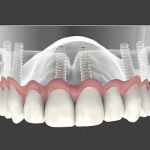Can Dentists Remove Tonsil Stones? What You Need to Know
As someone who has struggled with tonsil stones, I understand how uncomfortable and frustrating they can be. Tonsil stones, or "tonsilloliths," form when food particles, bacteria, and dead cells get trapped in the pockets of your tonsils, hardening over time. They can cause bad breath, discomfort, and even infections. One of the common questions I had when I first experienced tonsil stones was, "Can a dentist remove tonsil stones?" In this article, I'll share what I’ve learned about tonsil stones, whether or not a dentist can remove them, and what treatment options are available to help alleviate the symptoms.
1. What Are Tonsil Stones?
Tonsil stones are small, hard deposits that form in the crevices of your tonsils. They occur when debris such as food particles, dead skin cells, and bacteria get trapped in the tonsil crypts and harden over time. While they are generally harmless, they can be very uncomfortable, causing symptoms like sore throat, bad breath, difficulty swallowing, and even ear pain. In some cases, tonsil stones may become infected and lead to swelling or a persistent sore throat. Understanding the causes and symptoms of tonsil stones is essential to determining whether you need professional help in removing them.
1.1 Symptoms of Tonsil Stones
While some people may not experience any noticeable symptoms, others may find tonsil stones quite bothersome. The most common signs of tonsil stones include:
- Bad breath (halitosis)
- Sore throat or a feeling of something stuck in the throat
- Difficulty swallowing or a sensation of tightness
- Pain in the ears
- Visible white or yellowish lumps in the back of the throat
If you’re experiencing these symptoms, it’s important to seek help to address the problem before it worsens.
2. Can Dentists Remove Tonsil Stones?
The answer to this question depends on your dentist’s experience and the severity of your tonsil stones. While dentists are primarily concerned with your oral health, they may be able to help if the tonsil stones are visible and easily accessible. However, it’s important to note that most dentists will not perform tonsil stone removal as part of a routine dental visit. Instead, they may recommend seeing an ear, nose, and throat (ENT) specialist if the stones are difficult to remove or if they are causing infections or other issues.
2.1 What Dentists Can Do
If you have visible tonsil stones that are easily accessible, a dentist may use a special tool, such as a curette or irrigator, to remove them. This process is relatively simple and quick, and it typically doesn’t cause much discomfort. In some cases, the dentist may also suggest using a gentle water spray or other devices to dislodge smaller stones.
While dentists can help in certain situations, they are limited when it comes to larger or deeply embedded tonsil stones. In these cases, a visit to an ENT specialist is usually recommended for a more thorough examination and removal.
3. When to See a Doctor for Tonsil Stones
If you have persistent or large tonsil stones that are not easily removed at home or by a dentist, it's a good idea to consult with an ENT specialist. An ENT doctor will have the necessary tools and expertise to safely remove tonsil stones, especially if they are causing infection or recurring symptoms. Additionally, an ENT can discuss preventive measures to reduce the likelihood of future tonsil stones.
3.1 Symptoms That Warrant a Visit to the Doctor
If you're experiencing any of the following, it’s time to see a doctor:
- Severe pain in the throat or ears
- Frequent or chronic tonsil infections
- Difficulty swallowing or breathing due to tonsil stones
- Persistent bad breath that doesn't improve with regular oral hygiene
These signs may indicate that the tonsil stones have become infected or are causing more significant issues that require professional treatment.
4. How to Prevent Tonsil Stones
While it may not be possible to entirely prevent tonsil stones, there are several strategies you can use to reduce your risk and minimize their recurrence. I’ve personally found that good oral hygiene is one of the most effective ways to manage tonsil stones.
4.1 Regular Oral Hygiene
Brushing your teeth and tongue regularly, along with flossing, helps remove the food particles and bacteria that can contribute to the formation of tonsil stones. Using a tongue scraper can also help clean the back of your tongue where bacteria tend to accumulate. Additionally, using mouthwash regularly can help kill bacteria and reduce the chances of tonsil stones developing.
4.2 Staying Hydrated
Drinking plenty of water is another key factor in preventing tonsil stones. Staying hydrated helps wash away food particles and bacteria from your mouth and throat, reducing the likelihood of debris getting trapped in the tonsils.
4.3 Gargling with Salt Water
Gargling with salt water is a simple and effective way to reduce inflammation and clear away debris from your tonsils. I’ve found that regular salt water gargles can help prevent tonsil stones and soothe any irritation in the throat.
5. Home Remedies for Tonsil Stones
If you’re looking for ways to manage tonsil stones at home, several remedies may help reduce their size or prevent new ones from forming. Here are some methods that have worked for me:
5.1 Gentle Removal at Home
Some people choose to gently remove tonsil stones at home using a cotton swab or the back of a toothbrush. However, this method should be done with caution to avoid injuring the tonsils or causing infection. If you choose to remove tonsil stones yourself, make sure to wash your hands and any tools you use to prevent bacteria from entering the area.
5.2 Using a Water Irrigator
A water irrigator or oral irrigator can be an effective tool for flushing out tonsil stones. This device uses a gentle stream of water to dislodge debris from the tonsils without causing harm. It’s a great non-invasive option for people who want to avoid surgery or more invasive treatments.







 Rollins & Petersen Orthodontics4.0 (348 review)
Rollins & Petersen Orthodontics4.0 (348 review) Audubon Dental Associates Ltd5.0 (6 review)
Audubon Dental Associates Ltd5.0 (6 review) Doc Bresler's Cavity Busters4.0 (363 review)
Doc Bresler's Cavity Busters4.0 (363 review) Smileawhile Dental4.0 (159 review)
Smileawhile Dental4.0 (159 review) Montclair Perio & Implant Specialists: Anne Hartnett, DDS0.0 (0 review)
Montclair Perio & Implant Specialists: Anne Hartnett, DDS0.0 (0 review) Dr. Shubha Soni-Gaur5.0 (1 review)
Dr. Shubha Soni-Gaur5.0 (1 review) The Importance of Oral Health Education During Pregnancy for a Healthy Pregnancy
The Importance of Oral Health Education During Pregnancy for a Healthy Pregnancy Best Tips for Brushing Your Teeth Properly for Healthy Gums: Essential Techniques for Oral Health
Best Tips for Brushing Your Teeth Properly for Healthy Gums: Essential Techniques for Oral Health Why Skipping Dental Checkups Can Lead to Bigger Oral Health Problems
Why Skipping Dental Checkups Can Lead to Bigger Oral Health Problems Advantages of Porcelain Dental Restorations
Advantages of Porcelain Dental Restorations How Can Diabetes Cause Tooth and Gum Problems? Preventing and Managing Oral Health Issues
How Can Diabetes Cause Tooth and Gum Problems? Preventing and Managing Oral Health Issues Healthy Habits for Promoting Good Oral Health and Hygiene: Tips for a Healthy Smile
Healthy Habits for Promoting Good Oral Health and Hygiene: Tips for a Healthy Smile